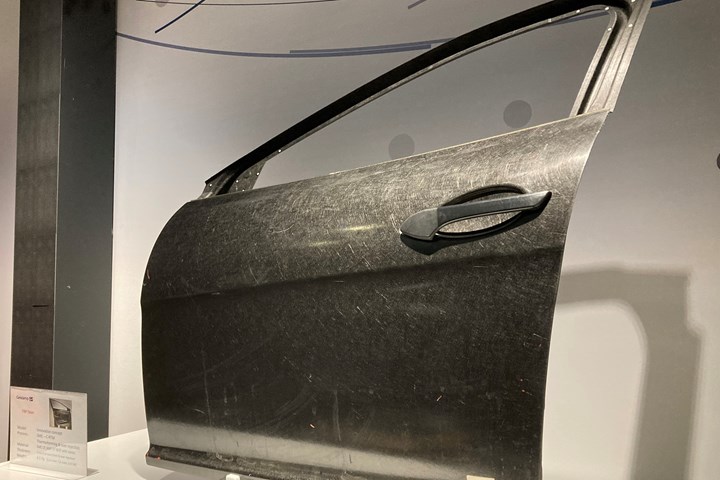RECONTRAS project validates use of microwaves and laser welding to obtain recyclable composites
Reseachers obtained a reduction in costs and energy consumption through the manufacture of three composite prototypes and confirm the feasibility of recycling and processing the resulting material.

Carbon fiber-reinforced thermoplastic automotive door panel prototype. Photo Credit: Aimplas.
Aimplas, the Plastics Technology Centre (Valencia, Spain) recently reported that it has made progress in regards to the EU-funded RECONTRANS project (see “Aimplas-led project develops thermoplastic prototypes”), which focuses on integrating unconventional manufacturing technologies to obtain cost-effective recyclable multi-material composites suitable for the transport sector at high production rates.
In particular, new thermoplastic composites have been developed through the integration of microwaves and laser welding. It has been demonstrated that microwaves can be used to optimize the curing process of composites in resin transfer molding (RTM) and pultrusion, which reduces the energy consumed, shortens manufacturing times and helps produce better quality parts. It has also been shown that laser technology can be used to obtain stable joints between the composite and metal, thus making it possible to eliminate riveted joints, which typically increase structural weight. Finally, studies were carried out on the recyclability of the thermoplastic composite by using it to manufacture a new part.
Aimplas says these results were validated through the manufacture of three life-size demonstration samples using various either carbon or glass fiber reinforcement and a thermoplastic acrylic resin, and one demo sample from the recycling material:
- A glass fiber-reinforced thermoplastic rear suspension system for a truck cab, manufactured by integrating microwaves into the RTM process; the composite-metal joint employed laser welding
- Carbon fiber-reinforced thermoplastic automotive door panel, manufactured via microwave integration with C-RTM
- Glass fiber-reinforced thermoplastic interior panel for the rail industry manufactured by using microwaves in the pultrusion process. The joint between the composite and metal parts was made using laser welding.
In addition, the recyclability of the materials was validated by manufacturing a demo sample of a car door handle made of 50% recycled material.
The RECOTRANS project, which started in October 2017 and ended in September 2021, receives funding from the European Union within the framework of the H2020 Program. A total of 13 partners from seven countries have taken part: Stadler, Gestamp, Mercedes Benz Türk, Arkema, INEA, Tecnoclad, Synthesites, Far-UK, CTAG, ITU, Fraunhofer, Polymec and Aimplas. The developments made in this project can be applied to other industries.
Related Content
-
ASCEND program update: Designing next-gen, high-rate auto and aerospace composites
GKN Aerospace, McLaren Automotive and U.K.-based partners share goals and progress aiming at high-rate, Industry 4.0-enabled, sustainable materials and processes.
-
“Structured air” TPS safeguards composite structures
Powered by an 85% air/15% pure polyimide aerogel, Blueshift’s novel material system protects structures during transient thermal events from -200°C to beyond 2400°C for rockets, battery boxes and more.
-
Jeep all-composite roof receivers achieve steel performance at low mass
Ultrashort carbon fiber/PPA replaces steel on rooftop brackets to hold Jeep soft tops, hardtops.
















